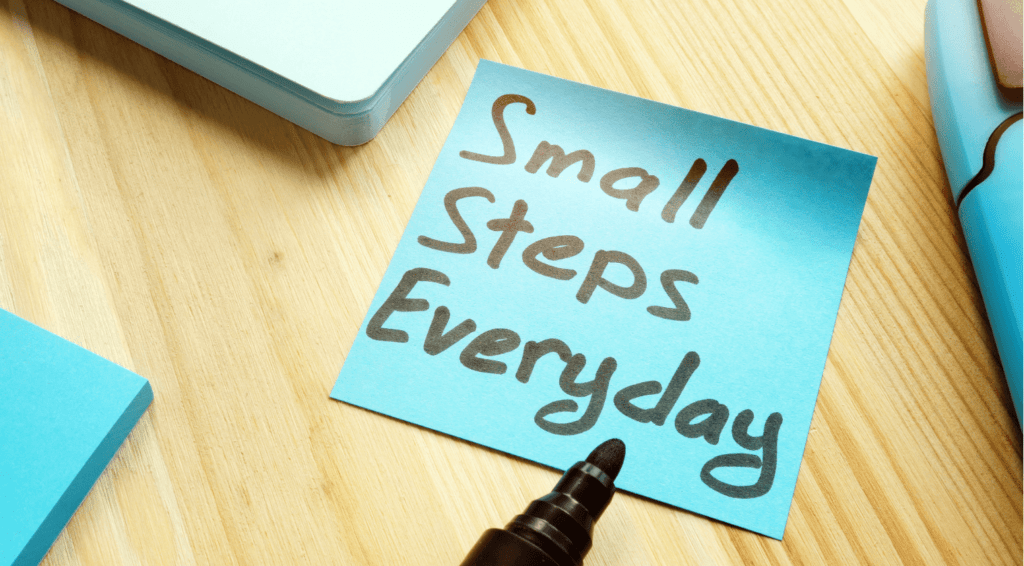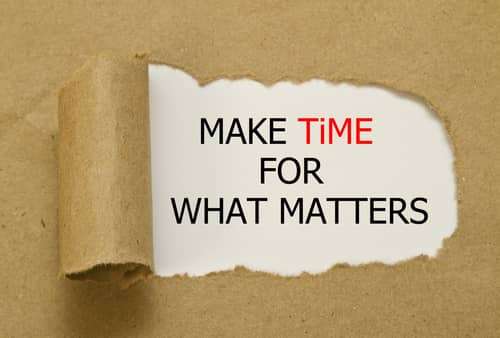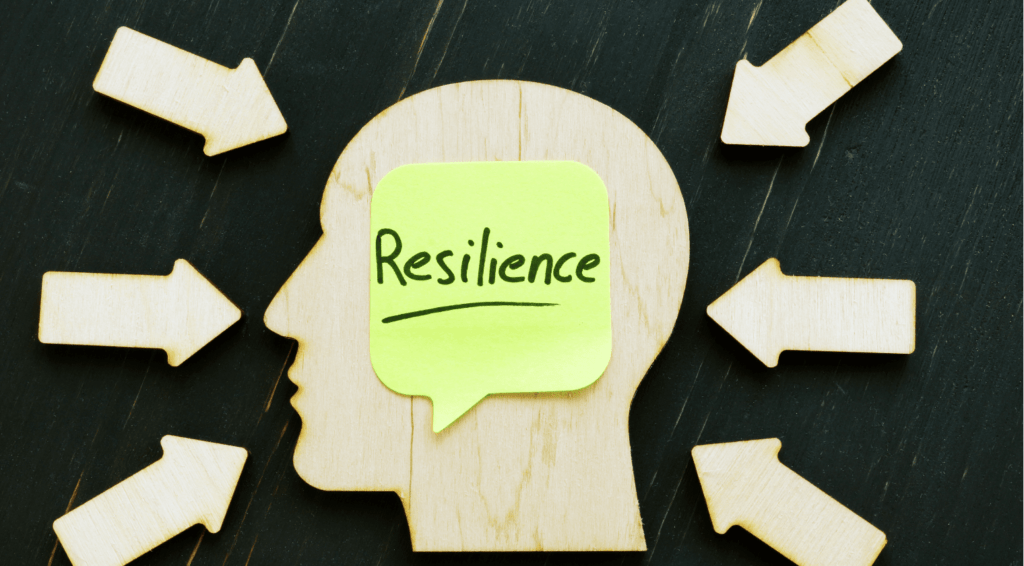Why Big Change Feels So Hard
We’re often told that if we want a different life, we need to make big moves. Quit the job. Start the business. Overhaul your habits. Go big or go home. But here’s the truth: most of us don’t need another overwhelming project. We need something that feels doable today, not something that weighs us down with guilt and stops us in our tracks.
The real secret to lasting change? Tiny commitments that stack up over time.
This isn’t about lowering the bar—it’s about focusing your energy where it actually counts. One step, done consistently, has far more impact than a dramatic leap you can’t sustain. In Acceptance and Commitment Therapy (ACT), we call this committed action—taking small, values-driven steps forward, even when life feels uncertain.
So instead of aiming for giant, unsustainable transformations, let’s explore how small daily actions—the kind you can do in five minutes or less—can truly shape your future self.
Why Tiny Commitments Work (The Science Behind Small Steps)

There’s a reason advice about “start small” has stuck around—it’s backed by psychology, neuroscience, and real-life experience.
- Your brain likes repetition, not drama.
New habits stick when they’re easy to repeat. Running a marathon is an amazing accomplishment, but… it doesn’t necessarily make you a runner—jogging for twenty to thirty minutes three times does move the needle closer to that ‘runner’ label.
- Small steps reduce decision fatigue.
When you try to overhaul your entire lifestyle, your brain rebels. But committing to something tiny (like drinking one extra glass of water) is far easier to sustain.
- Consistency rewires your brain.
Each repetition strengthens neural pathways, making the behavior more automatic over time.
The point isn’t perfection—it’s direction. Every small action that lines up with your values is a vote for the kind of person you want to be.
Example: Instead of vowing to meditate for 30 minutes every morning, start with 2 minutes while your coffee brews. Small, but doable—and it still counts.
The Psychology of Momentum
Ever notice how one small win can set the tone for the whole day? That’s momentum at work.
- Send one email, and you might just feel ready to tackle three more.
- Put your workout clothes on, and you’re on your way to exercising.
- Write a single sentence, and you’ve started your essay.
This is how tiny commitments beat avoidance. When anxiety tells you something is “too big,” you can outsmart it by shrinking the task. Momentum builds from action, not from waiting until you “feel ready.”
But here’s the catch: momentum can sometimes tempt you to go all in—to ride the wave of energy until you burn out. That feels great in the moment, but your brain remembers the crash. Next time you try to build momentum, it may resist, thinking, “I’m not falling for that trick again.”
The key is balance. Pair your momentum with clear, realistic goals. Even if you feel the urge to do more, stick with the small commitment you planned. That way, your brain learns that momentum is safe, repeatable, and not a setup for exhaustion.
Avoidance feeds stress. Tiny steps break the cycle by proving you can take action—even when discomfort is present. And when paired with mindful pacing, they help you build a rhythm of progress you can actually sustain.
Tiny Commitments in Daily Life
At Work
- Instead of “clear my entire inbox,” commit to responding to 3 emails.
- Review a project dashboard once a week instead of micromanaging daily updates.
- Take a 2-minute reset before meetings rather than pushing through nonstop.
At Home
- Follow the “one dish rule”—wash just one plate or pan after cooking. Often you’ll do more, but even if you don’t, you’ve kept the system moving.
- End your day with a 5-minute reset: fold a blanket, put your phone on the charger, jot down tomorrow’s priorities.
- Use simple systems (like a weekly checklist for chores or homework) instead of hovering over every detail.
For Your Mind
- Write down 3 values-driven intentions each morning (“Be patient in meetings,” “Reach out to a friend,” “Leave work at work”).
- Try a micro-mindfulness moment: notice 3 things you can see, hear, and feel.
- Keep a “done list” alongside your to-do list to remind yourself of progress.
These aren’t about doing everything—they’re about choosing something small and sticking with it.
When Small Steps Don’t Feel Like Enough
Let’s be honest—sometimes small changes feel painfully slow. You may catch yourself thinking: This isn’t working. I need a total overhaul.
Here’s where perspective matters. Think about steering a ship: a one-degree shift doesn’t look like much, but over miles, it changes the entire destination.
ACT reminds us: it’s not about instant relief—it’s about movement in the direction of your values. Tiny steps build a path forward, even when the pace feels slower than you want.
If you find yourself stuck in frustration or lost trying to find direction and momentum, this may be a good moment to reach out for extra support. A therapist can help you sort through a myriad of emotions, previous efforts, and next steps and build a plan that feels both sustainable and meaningful.
You’re ambitious and already doing a lot—make sure your wellness isn’t an afterthought. Drop your email below to subscribe and get new blog posts with practical, evidence-backed wellness tips you can start using today—no inbox overload, unsubscribe anytime. (For info only; not a substitute for professional advice.)

Tiny Commitments for Resilience

Resilience isn’t built in crisis—it’s built in everyday moments. Each small, repeated action strengthens your ability to handle stress when bigger challenges come.
- Setting boundaries → saying “no” once today makes it easier to say it again tomorrow.
- Self-compassion → offering yourself kindness during one mistake lays the groundwork for bigger failures.
- Values-aligned choices → picking rest over overwork one evening sets the tone for sustainable achievement.
This is how small commitments build resilience. Over time, they rewire not only your habits but also your self-concept. You start to see yourself as someone who can handle stress, stay flexible, and bounce back.
Simple Ways to Start Today
If this feels overwhelming, try starting here:
- Pick one area that matters (health, relationships, personal growth).
- Choose a 2–5 minute action that aligns with it.
- Stack it onto something you already do (habit stacking: journal while the coffee brews, stretch before bed).
- Write a “minimum version” of your goal (walk for 5 minutes, not 5 miles).
- Celebrate completion, not perfection.
Remember, it’s not about how big the step is—it’s about taking it.
Your Future Self Starts Small
It’s easy to underestimate the power of small commitments. But the truth is, big shifts come from tiny, repeated actions—not from waiting for the perfect moment to change everything at once.
If you’re ready to start, pick one action today. Keep it simple, values-driven, and repeatable. That’s it.
Over time, those small steps create a life that feels more balanced, resilient, and authentic…because the real power isn’t in avoiding struggle, but in learning how to move through it with small, steady steps.

J. Oni Dakhari, PsyD
ABOUT THE AUTHOR: J. Oni Dakhari, PsyD, is a clinical and pediatric psychologist who loves languages, is an avid traveler, and finds boundless excitement in the pursuit of knowledge and helping others.
Health Information Disclaimer: Attention Required
No content on this site, or any of the references or links, should ever be used as a substitute for direct medical advice from your doctor or other qualified clinician. The content of the blog, including any references, resources, links, or other shared knowledge, is for informational purposes only. No content whatsoever should be taken as a replacement for medical, clinical, professional advice, diagnosis, intervention, or treatment. Any action or inaction as a result of any content you consume, including within the blog, references, resources, links or other associated knowledge, is done solely at your discretion.
The blog author and associated professionals cannot be liable for any of the consequence of such action or inaction. Accessing or using any of the content of the blog, including any references, resources, links, or other shared knowledge does not create a doctor-patient relationship between the author or associated professionals and you. If you choose to contact the blog author or any associated professionals of Dakhari Psychological Services, LLC to provide personal, medical, or clinical information, this does not create a doctor-patient relationship. It’s crucial to consult with a qualified healthcare provider for individualized advice regarding your health concerns.
Affiliate Disclosure Disclaimer:
Please note this post may contain affiliate links. This means I may receive a commission if clicked at no extra cost to you.





